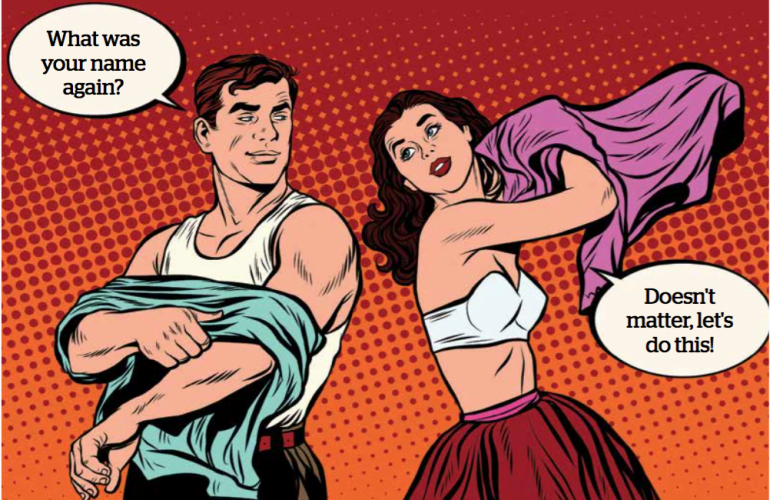With things like ‘sexting’, ‘nudes’ and 50 Shades of Grey so prevalent today, Get it’s Kirstin Cuthbert investigates what the younger generation needs to know
The talk used to go like this… When a Mummy meets a Daddy and they are in love they share a special hug and a baby comes along. Nowadays it’s more like when Sally matched with Tim on Tinder she went over to his house for a night of casual ‘hugs’ with no love and no further contact after the night…
WHY THE TALK HAS CHANGED
Sexpert and author of For Foxes’ Sake Row Murray believes there is an absolutely huge gap in the sex education programs in schools as a result of the online world.
“It’s great to have all the biology and the safe sex conversation, but I really feel sex ed today is lacking in love, relationships, peer pressure, consent and common sense,” Row says.
“There’s never been a generation that’s experienced what teenagers are going through right now and they are forced to become responsible earlier. A lot of parental choice in the conversation is taken away now because kids can hop on their phones and find out anything in five minutes.”
Having ‘the talk’ with children is something most parents feel a little uneasy about but it’s never been more crucial. Children are being exposed to sex at a younger age not only from social media but also online porn explains Row.
“It’s estimated that 30-40% of all online traffic today is online porn and that’s free porn,” Row says.
“Some research is saying that young people from the ages of eight and nine are seeing porn for the first time, and by the time they’re 12 and 13 the majority have viewed hard-core porn.”
A Plymouth University study surveyed 1000 young people, with some saying they first watched pornography aged 11 or 12. The research also found that a third of people aged 16 to 24 found sex with partners difficult because of what they had seen online. We’ll get into more of that later in the article.
WHEN TO START THE DISCUSSION
Age-appropriate discussions need to happen from kindergarten level according to Row.
“Kids do need to know correct terminology for their genitals and body autonomy, as a lack of body awareness and autonomy contributes to child sex abuse being hidden away and kept as a secret,” says Row.
Dr Donna Burgess who practices at the Gold Coast Women’s Health in Broadbeach also believes when having the talk, the younger the better.
“If parents can start the discussion in primary school that’s really important. Parents need to keep it very black and white as that’s how kids accept things,” Dr Burgess.
“Once they get into high school it all gets a bit awkward, a bit embarrassing, as puberty has already well and truly started. Most kids are starting puberty at about 10 so you really want to have that conversation before puberty, so eight or nine years old.”
For any parents concerned that talking to their children about these things at a young age may have a negative effect, Dr Burgess assures that’s not the case.
“Informing children young does not promote being promiscuous in anyway, it’s just opening their eyes to normal things and it helps prevent them from getting the abnormal information in the playground.”
Row also says when it comes to things like porn and sex, the much more gnarly conversations, really should be happening from 10, 11 and 12.
“Kids are watching porn from a young age so if parents are waiting until 14 or 15 to start talking to them, they’ve missed the boat by years,” Row says.
PORNOGRAPHY
While it most likely wasn’t part of the discussion your parents had with you, pornography is definitely something that needs to be talked about.
“There are a lot of people in denial that their children look at this material and there’s a lot of unwillingness to accept it,” Row says.
“A lot of parents have put structures in place, they might have rules that mobile phones are switched off at 9pm or that they don’t go in the bedrooms, but the majority of online sex material is actually viewed outside of the family home and it’s on mobile devices.”
Row says it’s also important to explain the difference between online porn and actual sex.
“Make it clear that it’s highly stylised and it’s often very polished body types. Explain to them that it’s the same difference as slopping around the house in your tracksuit pants versus walking down the red carpet,” Row says.
Porn also doesn’t show the safety measures and the preparation that goes into sex, in all the different forms, Row says.
“Condoms are often not used in porn and teenagers need to know that they have to roll one on every time,” she says.
Row also says they need to know that just because they see it online or read it in books, like 50 Shades of Grey, doesn’t mean that’s expected of them.
“All the erotica, movies and online porn is dressed up as a bit of a smorgasbord and implies this is to be expected,” Row says.
“If they are taught to have the confidence to respect themselves and then understand the consent and the boundaries of other people around them from a young age, they’re going to be a lot better off.”
SEXTING
Sexting, for those who don’t know, is sending sexy pictures and sexual messages. This can be via text messaging, Facebook messaging or the ever popular Snapchat. Row says this is a vital topic as many young girls are pressured into swapping ‘nudes’ (naked images of themselves), and many young boys are very willing to send unsolicited genital pictures.
“Legislation is changing but there are still a mountain of kids out there that could go up on child porn offences and end up on the sex offenders register for life if they’re swapping nudes around whether they’re creating it or obtaining it,” Row says.
“Parents need to actively discourage sexting between teenagers as much as they possibly can and be really clear that it’s completely illegal.”
CONTRACEPTION AND STIs
While these two factors have always been important in the birds and the bee’s discussion, they are just as relevant as ever. Dr Burgess says the most popular contraception young women are using these days is the combined pill.
There’s a lot of misinformation out there online so it’s important to give your children informed advice and also take them to see a doctor should they be considering contraception.
A recent concerning addition to the contraceptive landscape is an app that measures your temperature and tells you where in your natural cycle you can have sex without getting pregnant. And the kit that is being marketed to young women on social media can be ordered online with no consultation needed. So what does a doctor think of it?
“I would definitely advise against that method as it has a high failure rate,” she says.
“It’s very irresponsible. Just because you can buy it, sell it or make an app out of it doesn’t mean it’s a legitimately sound piece of advice.”
Dr Burgess also says there’s many younger women asking for non-hormonal and more natural contraceptives these days and there are many scientifically backed contraceptives that meet these needs, like a one size fits all diaphragm and copper IUCDs.
“The other important thing too is the continued use of condoms to prevent against STIs (sexually transmitted infections). The contraceptive will help against unwanted pregnancies and the condoms help protect against STIs, and there’s certainly a lot of STIs on the coast.”
Common ones Dr Burgess sees are chlamydia and herpes and then after that some less contagious things like atypical bacteria. She recommends STI testing with any new partners.
HAVING THE TALK
Row says it’s important to not have one talk but lots of conversations frequently.
“Don’t sit down and have one great big talk at a set magical age. It’s actually more about having heaps and heaps of regular conversations,” Row says.
Another important thing is to put aside all judgement.
“Parents need to not judge them for the questions they are asking. Keep the communication open and don’t make them feel like they have to start hiding things,” she says.
“No matter how scary the conversations might be, parents need to be the adults, suck it up and deal with their own personal yucky feelings. They also needs to listen. Really, really listen to what their kids are saying.”
One last thing Row encourages is to open up relationships with their teenagers and other people like a god parent, an aunt or slightly older cousin, someone that they know and trust.
“It takes a village to raise a child and that’s never been truer. Let the person know that they have your blessing to talk to your teenager about anything, go nuts!”





